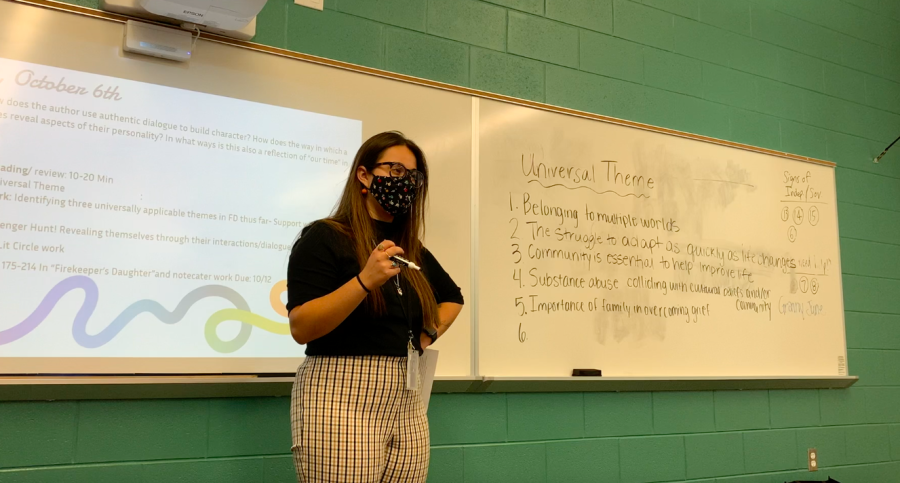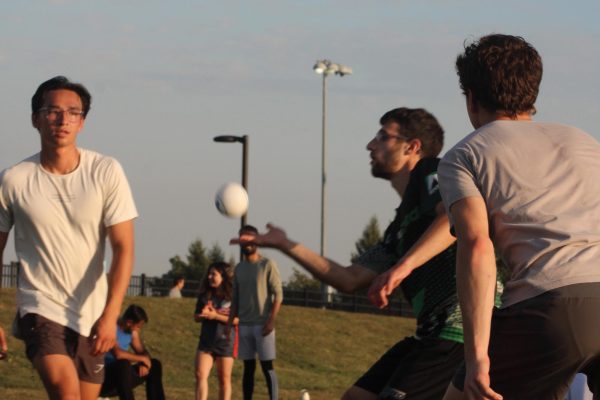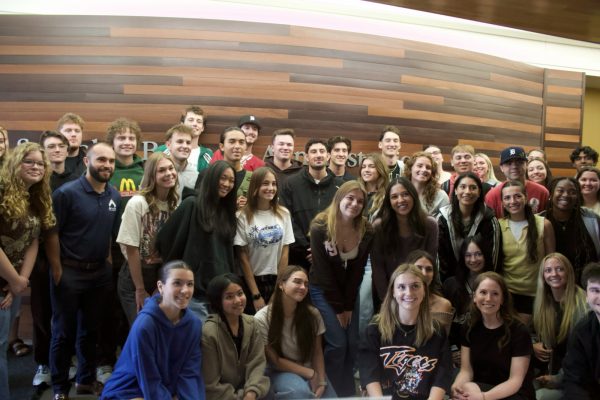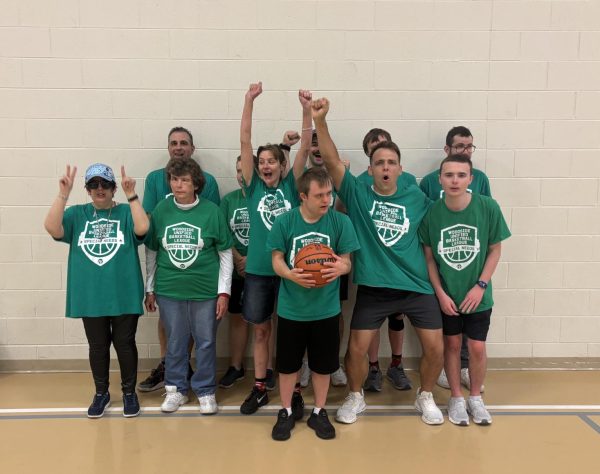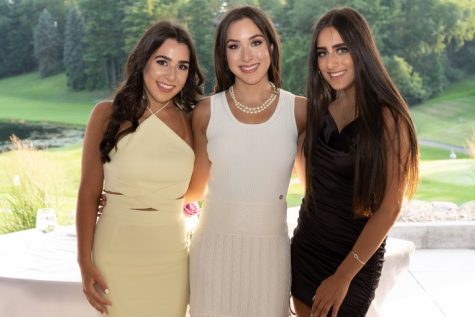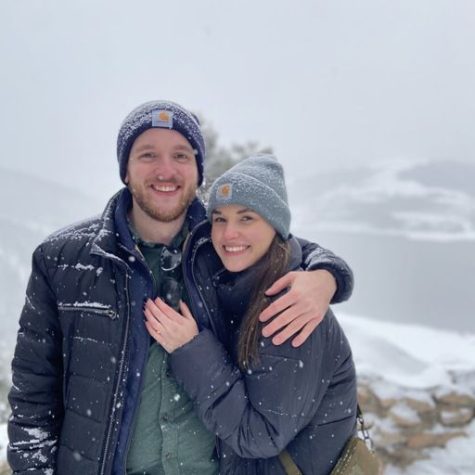People of OU: English major, educator, LAS architect, Ashleigh Dubie
Photo courtesy of Ashleigh Dubie
Ashleigh Dubie in the middle of a lecture at Bloomfield Hills High School. Now in her fifth year of the English STEP program, she is enjoying her student teaching.
A senior in the English STEP program, former OU Sigma Tau Delta president and one of the architects of OU’s Land Acknowledgement Statement (LAS) — Ashleigh Dubie has left her mark on OU and is looking forward to her career as an educator. Her five-year journey on campus has taught her about what it means to be a part of and serve a community, and helped her reconnect with her identity as a Cherokee woman.
Now a student teacher at Bloomfield Hills High School, Dubie is taking what she learned at OU and transitioning to the next stage of her life.
“I work with 10th graders, I teach two courses,” Dubie said. “1900 to [present-day] American Lit, which is co-taught with our US history course … And 1600 to [present-day] American Lit, which is co-taught with the AP US history class … I love it. I mean, my kids are great. My students are awesome.”
An individual of many talents, teaching was the right choice for Dubie even if it wasn’t immediately apparent. Her skills as a soprano and public speaker presented opportunities, but ultimately weren’t the right fit for her.
“I wasn’t planning on being an English major, or an English teacher until literally my senior year of high school,” Dubie said. “[For] a while I was like ‘I’m going to be an opera singer’ because I [was] classically trained throughout middle school and high school. I had inquired [about] some opera stuff … I realized when I was in high school ‘I’m good, but I’m not good enough for that,’ I can understand my limits … [So then I thought] ‘I’m gonna be a lawyer.’ I was in Mock Trial in high school, I really loved it … I’m pretty skilled at public speaking … being able to discuss things with a clear head. But then I was really thinking about [wanting] to be a mom one day, and … that seems like kind of a difficult thing to balance. Also … that’s a lot of student debt. So one day, I woke up [and was like], ‘what if you’re an English teacher?’ And I was like, ‘That doesn’t sound half bad. I’ll just do that. I’ll go into that.’ And I fell in love.”
While she doesn’t consider herself the most avid reader, she does love doing literary analysis. Some of Dubie’s favorite authors to study include James Baldwin, George Orwell, F. Scott Fitzgerald, Kurt Vonnegut and Herman Melville. Books that she’s excited about teaching to her students include “Firekeeper’s Daughter” and “Fahrenheit 451.”
A recipient of the Undergraduate Distinguished Achievement Award, Dubie’s hard work in the classroom opened the door to the relationships and opportunities she’s had at OU. Her relationship with Professor Katie Hartsock for instance, led to her taking over as president of OU’s chapter of English honor society, Sigma Tau Delta.
Leading the organization through the tumult caused by COVID-19 during the 2020-2021 school year, Dubie was tasked with balancing having the organization try to do events and activities while being sure to support members during such a difficult period in everyone’s lives.
“It was really hard to do … I was glad to do it,” Dubie said. “ … [For me] it was giving back to the English department and the community when they needed it. They needed somebody to fill this role and so I was like, ‘I’m gonna give my time up to help.’”
While she was president of Sigma Tau Delta, she was also dedicating time to another community project — drafting OU’s LAS. A monumental achievement for a student to be involved in, working alongside Professors Megan Peiser (tribal affiliation Choctaw Nation of Oklahoma), Andrea Knutson and Mozhgon Rajaee during the process of constructing the acknowledgement statement was a life-changing experience for Dubie.
“It’s helped me strengthen my sense of identity,” Dubie said. “There are times that I get in my own head because I don’t talk to my [Indigenous] family and family is a really big thing within our communities … Me no longer being in contact with my Indigenous family for so long, that felt like well I’m no longer Indigenous because I’ve cut off this big lifeline we’re supposed to have. Then I realized by talking to others that this is not an uncommon thing … That I belong, I’m loved and cherished. I’m no less Indigenous because of the things that have happened to me. That’s what this has shown me. And of course, it’s been a lot of reassurance also from Dr. Knutson and Dr. Peiser. I’m very close with both of them.”
While the LAS was an important move in the right direction for the university, it’s a foundational step. Dubie hopes that OU will follow through with the promises they outlined when announcing their adoption of the LAS.
“Even after this acknowledgement is passed, we still see this level of indifference,” Dubie said. “A pure disregard that is really hostile because indifference, disregard and wanting to just put Indigenous people on the backburner is what also then fields continued genocide … not caring about them and not paying attention to them or their needs and treating them as not as important as other groups … You can see the university following in those steps. Not treating [Indigenous people] as important as other groups of students.”
Moving forward in life, Dubie thinks the thing about her time at OU that will stick with her the most is the friendships she’s made as a student.
“This is cheesy, [but I think of all the] really wonderful friends that I’ve made,” Dubie said. “ … growing up, I didn’t have a lot of friends. I’ve never been a really friend oriented person … [As a student at OU] I have made so many friends that love me so much, and they care about me so much. I have so many people now, in my life that mean so much in ways that I never felt really before growing up … The most important thing is I’m leaving feeling like a more-whole person because I have this community of people who surround me and love me and support me.”



